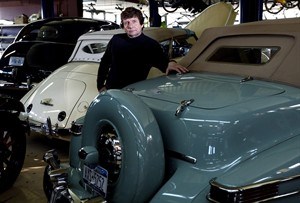
Owner David Grainger poses with some of his restored classic antique cars at The Guild of Automotive Restorers business in Bradford, Ont., on Monday, Nov. 16, 2009. Besides owning the Bradford, Ont.-based Guild, Grainger is the star of “Restoration Garage,” the reality TV series that gives viewers a behind-the-curtain look at the garage and car restoring. The show begins its second season Monday night on History. THE CANADIAN PRESS/Nathan Denette
Republished September 05, 2014 - 5:30 PM
Original Publication Date September 05, 2014 - 1:30 PM
MONTREAL - Thinking about buffing up an old rustbucket and making a pile of cash?
Think twice and do your research, says one of North America's top automotive restorers.
David Grainger, president of the Guild of Automotive Restorers, says not every car brings in the big bucks, and restoration for nostalgia's sake can cost thousands of dollars.
"If you're thinking, 'I really want a '69 Mustang; I'm going to buy this old junker and make one,' don't do it," says Grainger in a telephone interview.
"If you want to buy a '69 Mustang, don't buy a clunker and restore it because you'll end up with a $200,000 '69 Mustang you could have bought in pristine condition for 30 grand. If you want one, go out and buy the very best one you possibly can, turn the key and go have some fun."
Besides owning the Bradford, Ont.-based Guild, Grainger is the star of "Restoration Garage," the reality TV series that gives viewers a behind-the-curtain look at the garage and car restoring. The show begins its second season Monday night on History.
A former wildlife artist who tinkered on old military vehicles in his spare time, Grainger started the guild with his wife more than 25 years ago.
Thousands of eye-popping cars of all types and vintages have passed through the shop since, and clients from all over the world now have their cars serviced there.
Car collecting is a popular pastime and participants regularly show off their rare rolling tin in rallies worldwide
"It's a fun hobby," Grainger said. "I know an awful lot of people who basically restore cars not with any intention of ever getting them finished (but) just to keep themselves busy."
People should consider what they're getting into if they want to get involved, Grainger advised. They should take a hard look at their skills and make sure they have the proper tools and a place to work, for example.
Parts are another consideration because many of the pieces needed for old cars simply aren't made any more and would need to be specially machined. Parts that do exist can be expensive.
"Where a carburetor used to be $20, you can pay $1,000 now," Grainger said. "I've actually got some carburetors in stock of my own which I wouldn't sell for any less than $15,000 or $20,000 because that's what the market is on those carburetors now. I'm not going to sell them now because if a car comes in that needs them, then I've got them."
He said most people get into collecting out of nostalgia, but there are some who look at buying cars as an investment.
It can be lucrative if you know what you're doing, Grainger said, noting that some antique and classic cars have shown a 55 per cent appreciation in value per year.
"But that's only a certain class of car," he added, pointing to unique Ferraris and other similar types that sell in the millions of dollars.
The market evolves fast.
Grainger recalled finding an Alfa Romeo Montreal a few years back that was priced at $32,000. He was going to offer $25,000 and then decided against it.
"Now they're $150,000 to $200,000 — and that's the same car," he said. A Dino Ferrari, which his wife liked, was going for $60,000 to $70,000 at one time and now clocks in at $500,000.
"And that's in a five-year period."
Cars from the 1930s and 1940s were hot when Grainger got involved in the trade, but he says that's not so now. An awful lot of cars from the 1950s are also going begging, he said.
"The cars that are the most popular are the cars of people's youth so what you find is it's the guys in their 40s who can now afford a toy that are buying and creating that market," he said, noting many of those cars are from the 1970s and 1980s.
"That's not the collectors' market. That's the nostalgia market. It's a very, very separate entity."
"Restoration Garage" has been a solid performer internationally for Montreal-based Pixcom Productions Inc., says president Nicola Merola.
The idea for the show came after Merola spotted an ad for the guild on the back of one of his car-crazy boss's magazines and they decided to pursue it.
Grainger initially wasn't interested because he'd been dissatisfied with an earlier reality show experience with a U.S. producer. He changed his mind when Pixcom showed him they wanted to do something realistic and not some schlocky soap opera.
"We do it the Canadian way," Merola said. "We don't fake stuff. We follow the action. It takes an enormous amount of time to restore a car so you have to adjust for that. You have to adjust the storytelling to the reality of the shop, of the people that you film.
"You build trust."
Pixcom has a large stable of reality shows in production and Merola says the guild is an "amazing" subject.
"We're in the business of creating heroes," he said. "I like the fact that ordinary people are doing what I consider extraordinary things, like what David and his guys are doing."
Follow @nelsonwyatt on Twitter.
News from © The Canadian Press, 2014